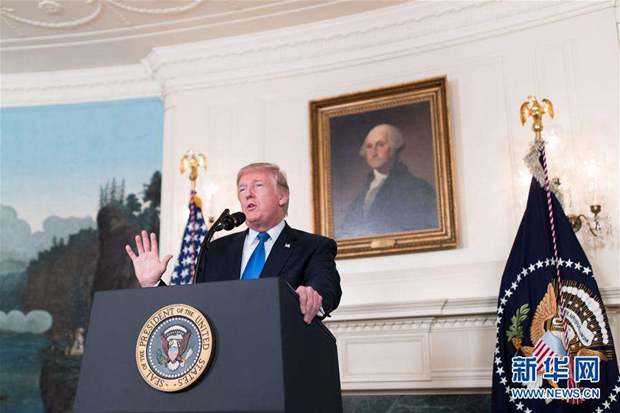JCPOA in crisis: Implications for the Middle East
- By Mohsen Shariatinia
 0 Comment(s)
0 Comment(s) Print
Print E-mail China.org.cn, August 1, 2018
E-mail China.org.cn, August 1, 2018

The Middle East is the region for irregular and zero-sum games where differences between countries or in relationships between people and their governments often and rapidly result in long wars of attrition. In such a region, the agreement on Iran's nuclear program to solve one of the most important crises in the Middle East is considered a great achievement for diplomacy, peace, and stability.
However, the withdrawal of the United States from Joint Comprehensive Plan of Action (JCPOA) could lead to its collapse. The fragility of the agreement, and the deprivation of Iran from its promised economic benefits, have created some frustration in Iran regarding the efficiency of diplomatic solutions for resolving differences between this country and the international community.
This frustration, amid attempts by the Trump administration to foment an economic crisis and public dissatisfaction in Iran, open the door for some kind of paradigm shift in Iranian foreign policy.
In recent weeks, Iranian leaders have threatened that, if the United States decides to completely cut off Iranian oil exports, they will not allow shipments of the precious commodity by other countries through the Strait of Hormuz at the head of the Gulf that Iran controls.
Moreover, the Iranian President Hassan Rouhani has warned the United States: "Do not play with the lion's tail," and that a "war with Iran will be the mother of all wars." In response, Trump's tweet threatens the Iranian president with an American military attack.
With the withdrawal of America from the JCPOA and intensification of its pressures on Iran, a growing number of officials in the latter are arguing that Washington has regime change in Iran on its agenda through intensifying economic pressure and expanding social dissatisfaction in the country.
In response to these pressures, the Iranian government has opted for a counter-containment strategy, trying to use all its power to confront the intensifying American threats.
For instance, its economic policies for coping with any sanctions that could be imposed in the coming months are changing. In foreign policy, Iranian officials emphasize the interconnectedness of the security of Iran and that of the entire Middle East and warn that insecurity in Iran will certainly spread through the region.
Although there has invariably been tension in U.S.-Iran relations during the past four decades, the depth and extent of that being witnessed at present is unprecedented in the past decade.
Iran and the U.S. are two key players in the evolving regional order of the Middle East. The future of the wars in Syria and Yemen, and also prospects for political stability in Iraq, depend on the role these two countries play, and on how they behave toward each other.
With the agreement on Iran's nuclear program, hopes had risen of a diplomatic resolution of the other crises in this region, but these hopes have been dashed by the American withdrawal from the JCPOA.
Intensification of tension between these two countries can establish irregular and zero-sum games as the dominant trend in the evolving order in the Middle East and expand instability.
If Iran withdraws from the JCOPA in the coming months, a new chain of security dilemmas will take shape in the Middle East, and the probability of another war will substantially increase. With the possible Iranian pull-out from the JCPOA, this country will restart its nuclear activities, increasing the probability of a U.S. military attack.
Even if the U.S. could somehow succeed in its policy of regime change and destabilization of Iran, the effects on the Middle East and on international security will be catastrophic.
The Arab Spring, and the fact that some governments in the region have become increasingly fragile in recent years, have led to the worst migration crisis in the post-World War II era, confronting the European Union (EU) with one of the most complex crises since its formation.
In addition, they resulted in the emergence of ISIS as one of the most complicated and dangerous terrorist groups.
Iranian instability can connect the chain of unstable states from Afghanistan on the borders with China to Syria on the Mediterranean Sea, and to the borders of the EU. Moreover, instability of Iran, as one of the most important oil producers, and as a country located in a crucially strategic position in the Gulf, can potentially put energy production and transit security at serious risk.
With the U.S. withdrawal from the JCPOA, the future of this agreement and the future of the fragile stability and security in the Middle East have become dependent on the role of both China and the EU.
Iran has raised continued oil exportation and access to the global banking system as its two key demands for remaining in the JCPOA and for continuing compliance with its commitments. Iran carries out about 50 percent of its foreign trade with China and the EU and exports half of its oil to them.
Furthermore, as a financial superpower, the EU can prepare the ground for continuation of banking interactions with Iran. Iran's agreement or disagreement with the other members of the JCPOA on the proposed package of the (EU3+ China and Russia), and especially its operational solutions, will have a key role in the future of the JCPOA, continuation of minimal stability in the fragile Middle East, and in preservation of the international nuclear non-proliferation regime and security of energy production and transit.
Mohsen Shariatinia is an assistant professor of regional studies at Shahid Beheshti University in Tehran.
Opinion articles reflect the views of their authors, not necessarily those of China.org.cn.






Go to Forum >>0 Comment(s)